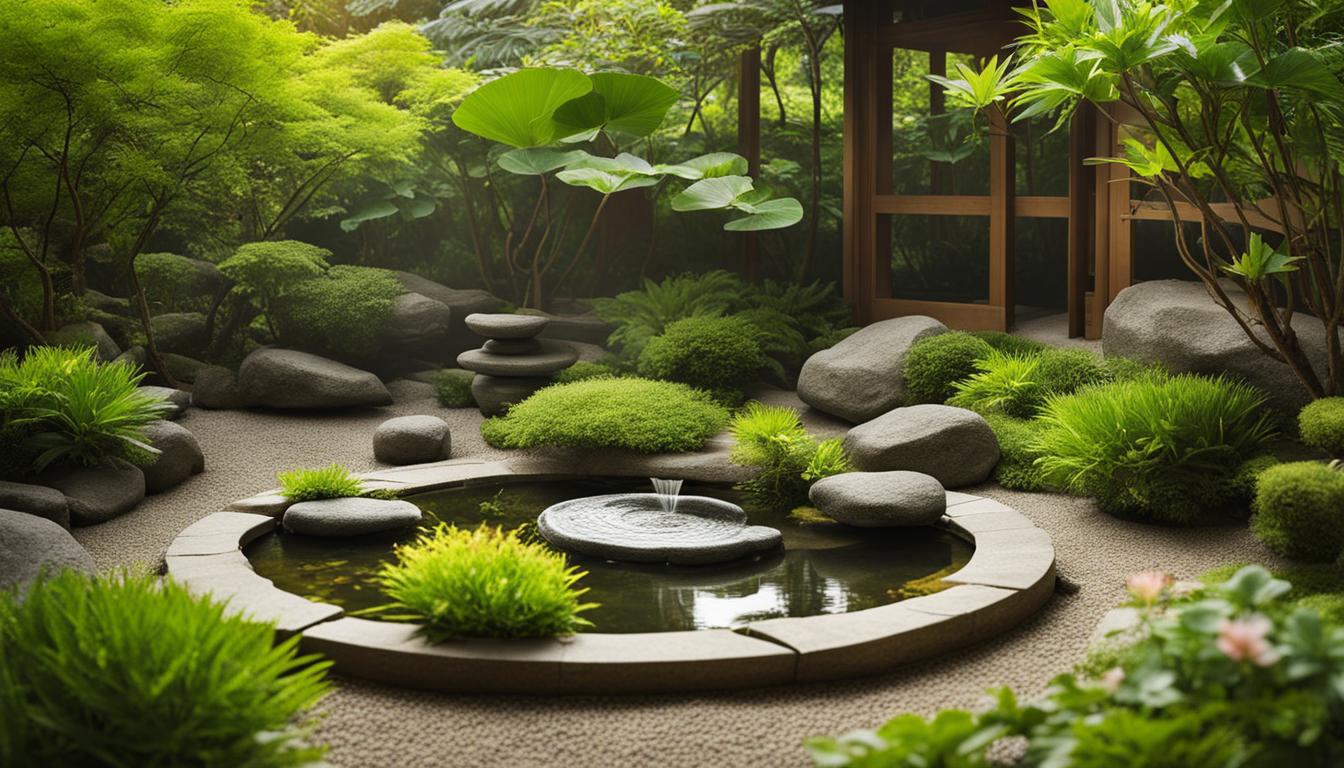Welcome to our comprehensive guide on how to feng shui your space using our expertly curated book. Whether you’re a beginner or have some experience with feng shui, our guide will help you bring balance, harmony, and prosperity into your home. Our guide is designed to provide you with a solid foundation in feng shui principles and techniques, as well as practical tips for applying feng shui in specific rooms and areas of your home.
- Our ‘How to Feng Shui‘ book guide is a comprehensive resource for bringing balance, harmony, and prosperity into your home.
- The guide covers feng shui principles and techniques, practical tips for applying feng shui in specific rooms and areas of your home, and strategies for attracting wealth, improving relationships, and promoting health and well-being.
- Whether you’re a beginner or have some experience with feng shui, our guide will provide you with the knowledge and tools you need to create a harmonious environment that supports your goals and aspirations.
- By applying the principles and techniques of feng shui, you can optimize energy flow, reduce stress, and enhance your connection with the divine.
- Start your feng shui journey today and discover the transformative power of this ancient art!
Understanding Feng Shui Principles
Welcome to our comprehensive guide on how to feng shui your home using our expertly curated book. Before diving into the various techniques and tips, it’s essential to gain a solid foundation in feng shui principles. Understanding these key concepts and theories will enable you to create a harmonious and balanced space.
The first principle of feng shui is the use of the five elements – wood, fire, earth, metal, and water. Each element has a specific energy and can be used to enhance or balance different areas of your home. For example, adding wood elements to a room can promote growth and vitality, while metal elements can bring clarity and focus.
The second principle is yin and yang, which refers to the balance of opposing energies in your space. Yin represents calm and receptive energy, while yang represents active and dynamic energy. To create balance, it’s essential to have a mix of both in your home.
The third principle is the bagua map, which is used to map out the different areas of your home and correlate them with different aspects of your life, such as wealth, relationships, and health. By using this map, you can identify which areas of your home may need balancing or enhancing.
By understanding these key principles of feng shui, you will be able to approach your space with a more informed and intentional perspective. In the next section, we’ll explore the various techniques you can use to apply these principles to your home.

Exploring Feng Shui Techniques
Now that you have a basic understanding of feng shui principles, let’s dive deeper into the various techniques that can be applied to different areas of your home. By applying these techniques, you can optimize the flow of energy in your space, promoting a sense of balance and harmony.
Furniture Placement
Furniture placement is one of the most important techniques in feng shui. By arranging furniture in a specific way, you can create a sense of balance and harmony in your space. Here are a few tips to keep in mind:
- Avoid placing furniture with sharp corners or edges facing doorways or walkways. This can create negative energy and cause obstacles in your life.
- Place your bed in a command position, facing the door but not directly in line with it. This creates a sense of safety and security.
- Avoid placing furniture in a straight line or against the wall. Instead, create a conversation area by placing pieces at a slight angle.
Natural Elements
Another important aspect of feng shui is incorporating natural elements into your space. By bringing the outdoors inside, you can create a sense of calm and tranquility. Here are a few ways to incorporate natural elements:
- Add plants to your space, especially in areas of stagnation or negativity.
- Use natural materials for your furniture and decor, such as wood, stone, and bamboo.
- Include water features, such as a fountain or fish tank, to promote the flow of energy.
Decluttering
Clutter is a major obstacle to good feng shui. It inhibits the flow of energy and can create stress and anxiety. Here are a few tips for decluttering your space:
- Get rid of anything that no longer serves a purpose or brings you joy.
- Organize your belongings in a way that makes sense and is easy to maintain.
- Invest in storage solutions, such as shelves or cabinets, to keep your space tidy.
By incorporating these feng shui techniques into your home, you can create a space that promotes balance, harmony, and positive energy.

Getting Started with Feng Shui in Your Home
If you’re new to feng shui, it can seem overwhelming at first. But don’t worry, with a few simple tips, you can start creating a harmonious environment in your home. Here are some beginner feng shui tips to get you started:
Assess Your Space
The first step in feng shui is to take a good look at your living space. Walk around each room and pay attention to how it makes you feel. Is the energy flowing freely, or does it feel blocked? Are there any areas that feel cluttered or stagnant? Once you identify these areas, you can start working on a plan to improve them.
Declutter Your Space
One of the most important principles of feng shui is decluttering. When your space is cluttered, the energy can’t flow freely, leading to stagnation and negative energy. Start by getting rid of anything you no longer need or love. Then, organize what’s left in a way that feels harmonious and balanced.
Use the Bagua Map
The bagua map is a tool used in feng shui to help you identify areas of your home that correspond to different areas of your life, such as wealth, career, relationships, and health. By understanding which areas of your home correspond to these areas, you can make adjustments to enhance the energy in each area of your life.
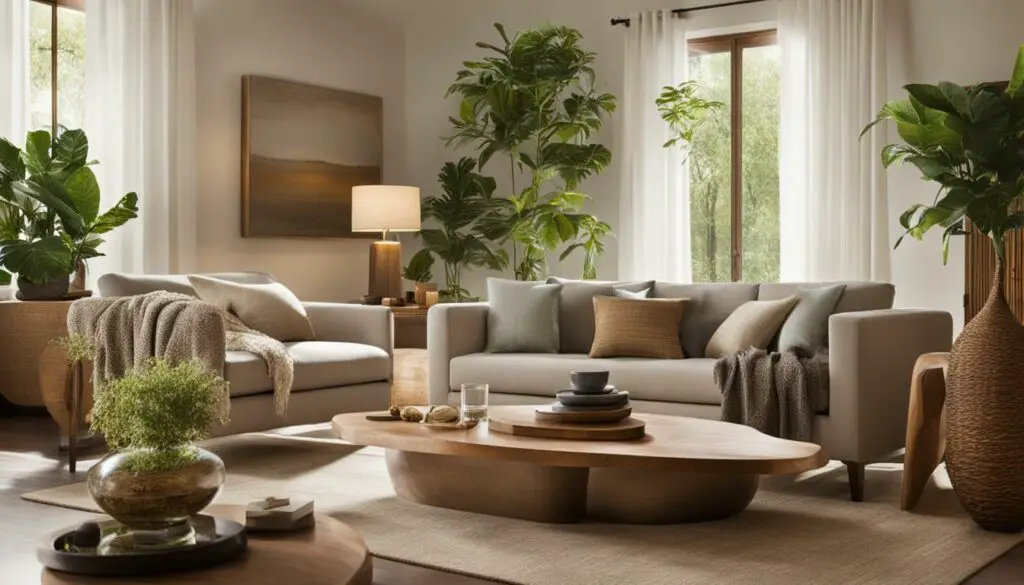
Get Rid of Negative Energy
Negative energy can accumulate in your home over time, leading to a feeling of heaviness or stagnation. To get rid of negative energy, try using feng shui tools such as sage smudging, singing bowls, or salt water cures. These tools can help purify the energy in your space and create a harmonious environment.
Create a Welcoming Entrance
In feng shui, the entrance to your home is considered to be one of the most important areas for energy flow. Make sure your entrance is clean, clutter-free, and welcoming. You can add plants, artwork, or other decorative elements to enhance the energy at your entrance.
With these beginner feng shui tips, you can start creating a harmonious and balanced environment in your home. Remember, feng shui is a journey, not a destination. Keep exploring and experimenting with different techniques to find what works best for you.
Applying Feng Shui to Specific Rooms
Each room in your home has a unique energy that can be optimized through feng shui design. By understanding the principles of feng shui, you can create a harmonious and balanced atmosphere in every room of your home. Here are some specific recommendations for each room:
The Bedroom
The bedroom is a sanctuary of rest and relaxation, and feng shui design can help create a peaceful environment for restorative sleep. Start by placing your bed in the commanding position, facing the door, but not directly in line with it. Use calming colors, such as blue or green, and avoid bright or bold patterns. Add soft lighting and natural materials, like cotton or silk, to promote a calm and soothing atmosphere. Avoid electronics, clutter, and mirrors, which can disrupt the energy flow and affect your sleep quality.
The Living Room
The living room is a space for socializing and relaxation, and feng shui design can enhance its welcoming energy. Start by decluttering and removing any obstacles that block the flow of energy. Arrange furniture in a U-shape or circular layout to encourage conversation and connection. Use warm colors, like red or orange, and incorporate natural elements, like plants or wood, to promote vitality and growth. Add soft lighting, artwork, and comfortable seating to create a cozy and inviting atmosphere.
The Kitchen
The kitchen is the heart of the home, and feng shui design can help create a nourishing and abundant space for cooking and eating. Start by keeping the kitchen clean and organized, removing any broken or unused items. Use the colors of nature, like green and brown, and incorporate natural materials, like wood or stone, to promote health and prosperity. Place the stove in the commanding position, facing the door, and keep it clean and in good working order. Add fresh herbs or plants to promote vitality and growth.
The Home Office
The home office is a space for productivity and focus, and feng shui design can help enhance your work performance. Start by placing your desk in the commanding position, facing the door, but not directly in line with it. Use a comfortable chair and ergonomic work tools to promote good posture and reduce stress. Use colors that inspire creativity and focus, such as blue or green. Avoid clutter and distractions, and add plants or natural elements to promote a calm and productive atmosphere.

Incorporating Feng Shui Colors and Materials
In feng shui, colors and materials have a significant impact on the energy flow in your home. By incorporating the right colors and materials in each area of your home, you can create a harmonious and balanced environment.
Here are some recommended colors and materials to incorporate in specific areas:
| Area of Home | Recommended Colors | Recommended Materials |
|---|---|---|
| Living Room | Warm colors like red, orange and yellow | Wood, leather and natural fabrics |
| Bedroom | Cool colors like blue and green | Soft, luxurious materials like silk and velvet |
| Kitchen | Earth tones like beige and brown | Stone, tile and other natural materials |
| Bathroom | White and light pastel colors | Metallic finishes such as chrome and stainless steel |
It’s also essential to choose materials that have a natural feel and texture, such as wood, bamboo, and stone. These materials can help to bring a sense of calm and tranquility into your home.
Remember to keep your color palette simple and avoid using too many colors in one space. Stick to a maximum of three colors per room to maintain a sense of balance and harmony.

Feng Shui Tips for Prosperity and Abundance
Unlock the secrets to attracting wealth and abundance through feng shui practices. Incorporating feng shui principles into your home can create a harmonious environment that promotes prosperity energy. Here are some tips to get you started:
- Activate your wealth corner: The southeast area of your home is considered the wealth corner in feng shui. You can activate this area by adding elements such as water features, plants, or symbols of abundance.
- Bring in money plants: Certain plants, such as jade, bamboo, and money trees, are believed to attract wealth and prosperity. Place them in your home office or living room to activate abundance energy.
- Display symbolic representations: Incorporate symbols of wealth and prosperity, such as the Chinese coins or a laughing Buddha statue, into your decor to attract positive financial energy.
- Use the power of color: The color red is associated with prosperity in feng shui. Use it in your decor through accents such as throw pillows, curtains, or artwork to activate abundance energy.
- Declutter your space: Clutter can block the flow of energy and prevent positive energy from entering. Declutter your home regularly to create a clear path for abundance energy to flow through.
Activate Your Wealth Corner
The wealth corner, located in the southeast of your home, is believed to be the area that governs abundance and prosperity. To activate this area, you should place objects and symbols that represent money and wealth, such as a bowl of coins or a small fountain, in this corner. You can also use colors that represent abundance to accentuate this area of your home, such as gold, green and purple. Incorporating these elements into your home decor can help to stimulate the flow of positive financial energy and attract prosperity into your life.
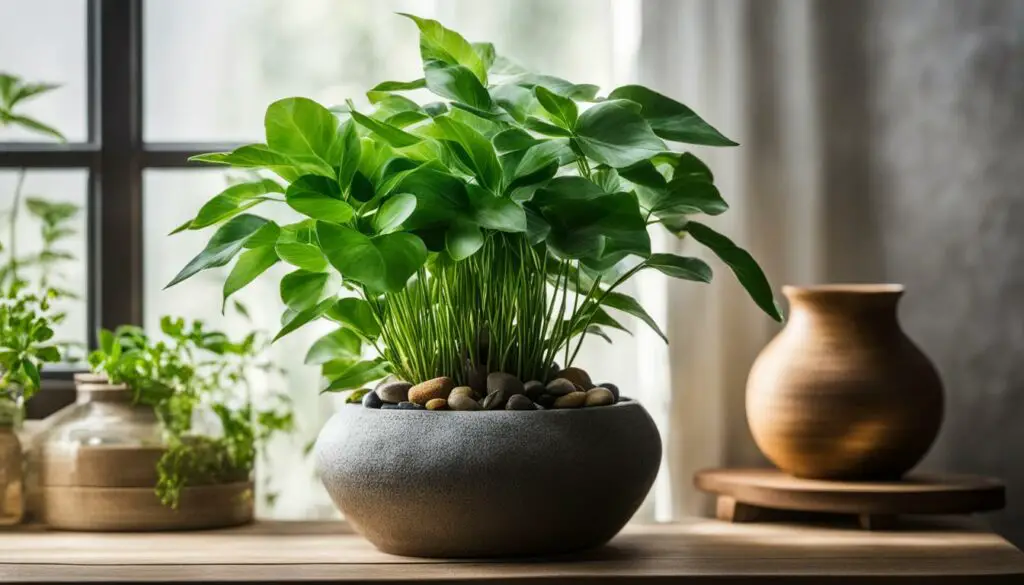
Enhancing Relationships with Feng Shui
As social beings, relationships are an essential part of our lives. They help us feel happy, supported, and fulfilled. Feng shui can be a powerful tool for enhancing relationships and attracting love into your life. By creating a harmonious environment and activating the relationship corners of your home, you can encourage positive energy to flow and foster deeper connections with those around you.
Relationship Corners
In feng shui, the southwest corner of your home is known as the relationship corner. This area is associated with love, intimacy, and partnership. By focusing on this corner and enhancing its energy, you can create a supportive environment for your relationships to grow and thrive.
To activate the relationship corner, decorate it with objects that symbolize love and partnership. This can include items such as:
- A pair of mandarin ducks
- A rose quartz crystal
- A photo of you and your partner
Be sure to keep this area clean and uncluttered so that energy can flow freely.
Bedroom Arrangements
The bedroom is another essential area to consider when it comes to enhancing relationships with feng shui. To create a supportive environment for love and romance, start with the bed placement. According to feng shui principles, the bed should be placed diagonally across from the door and have a solid headboard.
Additionally, avoid storing items such as exercise equipment or work-related materials in the bedroom, as these can create conflicting energies and interfere with relaxation and intimacy. Instead, focus on creating a peaceful, calming environment that supports rest and relaxation.
Love Symbols
Decorating your home with love symbols is a simple yet effective way to enhance the energy of your space and attract love into your life. Some popular love symbols in feng shui include:
- Heart-shaped objects
- Red and pink accents
- Peonies or other flowers associated with love

By incorporating these symbols into your home decor, you can create a supportive and loving environment that helps your relationships flourish.
Overall, utilizing feng shui tips and techniques can help improve relationships, cultivate love and intimacy, and create a harmonious home environment.
Feng Shui for Health and Well-being
Feng shui is not only about creating a beautiful and harmonious space but also about promoting health and well-being. The energy flow in your home can have a direct impact on your physical, emotional, and mental health. By incorporating feng shui principles into your home, you can create a peaceful and healing environment that supports your well-being.
Here are some feng shui tips for promoting health and well-being:
- Let natural light in: Natural light is essential for our health and well-being. Ensure that your space receives enough natural light during the day. If that’s not possible, invest in full-spectrum light bulbs that mimic natural light.
- Use calming colors: Colors have a significant impact on our mood and emotions. Use calming colors such as green, blue, and soft pastels to create a relaxing atmosphere in your home.
- Incorporate plants: Plants not only help purify the air but also promote a sense of calm and well-being. Choose plants with rounded leaves and avoid plants with sharp or spiky leaves.
- Create a cozy bedroom: Your bedroom should be a restful and rejuvenating space. Use soft lighting, comfortable bedding, and soothing colors to create a cozy and relaxing atmosphere.
Feng Shui Bed Placement
One critical aspect of feng shui for health and well-being is the placement of your bed. The position of your bed can affect the quality of your sleep and your overall health. Here are some tips for placing your bed according to feng shui:
| Bed Placement | Description |
|---|---|
| Headboard against a solid wall | Placing your bed against a solid wall provides a sense of stability and support. |
| Avoid placing the bed under a window | The energy flow from the window can disrupt your sleep and affect your health. |
| Do not face the door or a mirror | Having the bed directly facing the door or a mirror creates a sense of vulnerability and can disrupt your energy flow. |
| Position bed diagonally from the door | Placing the bed diagonally from the door allows you to see the door without being directly in line with it. This position creates a sense of security and comfort. |
By following these feng shui tips, you can create a space that promotes health, well-being, and a better quality of life.

Feng Shui for Career and Success
Are you looking to enhance your professional success? Feng shui can help! Here are some tips to optimize your workspace:

- Choose the right location. Ideally, your office should be located in the southern section of your workspace. If this isn’t possible, try to position your desk so that you face south.
- Clear the clutter. Keep your workspace tidy and organized to promote clarity of mind and productivity. Remove any unnecessary items from your desk and use storage solutions to keep things in their proper place.
- Optimize your desk placement. Your desk should be facing the door, but not in direct alignment with it. This allows you to see who is coming and going, while also providing a sense of privacy and security.
- Incorporate supportive symbols. Place items on your desk that represent success, prosperity, and abundance. These can include crystals, plants, or artwork that inspires you and promotes positive energy.
- Maximize natural light. Natural light is essential for creating a vibrant, energetic workspace. If possible, position your desk near a window and open the blinds or curtains to let in as much natural light as possible.
Feng Shui for Career and Success: Case Study
“When I started my own business, I knew I wanted to create a workspace that would promote my success and growth. Applying feng shui principles helped me to optimize my office layout and design, and I’ve seen a noticeable difference in my productivity and focus. I’m so glad I decided to incorporate feng shui into my professional life.”
-Samantha, small business owner
Feng Shui for Mental Clarity and Peace
To achieve mental clarity and peace, it’s essential to create a relaxing and soothing environment that promotes relaxation and calmness. Applying feng shui principles can help you achieve that balance in your home.
The Power of Calming Colors
Choosing calming colors for your home can significantly impact your mental well-being. Soft blues, greens, and lavenders promote relaxation, while pale pinks, creams, and beiges create a sense of calmness. Avoid using bold and vibrant colors in your space, as they can be overstimulating and disrupt your peace of mind.
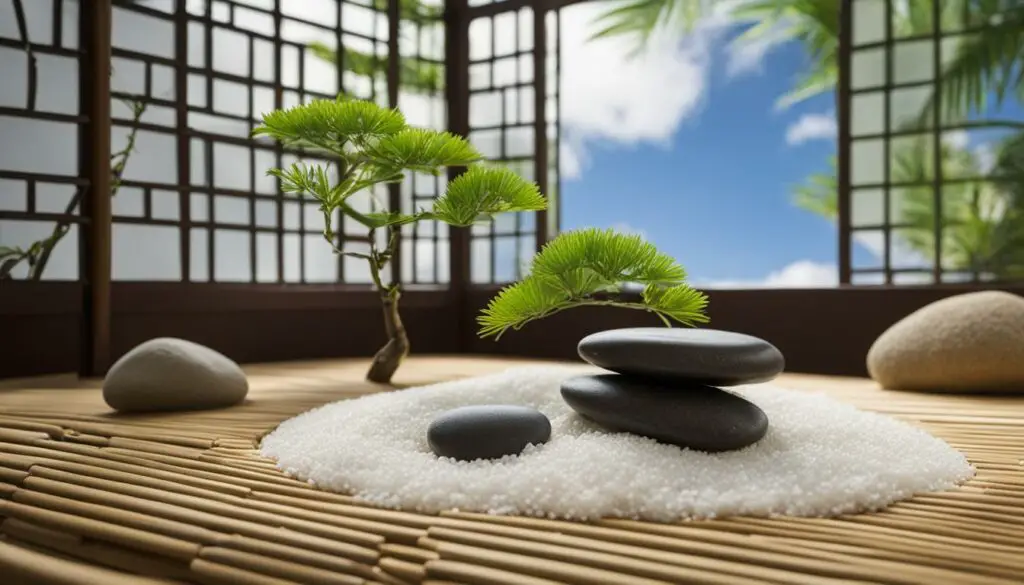
Removing Clutter for Mental Clarity
One of the fundamental principles of feng shui is removing clutter from your home to promote positive energy flow. Clutter can create chaos and mental stress in your life. Simplify your space and keep only the items that bring you joy or have a specific purpose. Utilize storage solutions to keep your space organized.
Nature-Based Design Elements
Incorporating natural elements into your design can also enhance mental clarity and peace. Houseplants, natural wood furniture, and stone accents promote a sense of calmness and tranquility. Utilize soft lighting fixtures, and incorporate natural light into your space to create a relaxing ambiance that supports your mental well-being.
“A calm and serene environment promotes inner peace and tranquility.”
Creating a Peaceful Bedroom
Designing your bedroom with feng shui principles in mind can help create a peaceful and calming space. Place your bed in a position where you can see the door, but it’s not directly in line with it. Avoid having any work-related items in your bedroom, such as a desk or computer, as they can disrupt your sleep and mental clarity.
- Choose comfortable bedding in soothing colors that promote restful sleep.
- Keep your space clean and organized to reduce stress and promote relaxation.
- Add a few small accents, such as candles or soft lighting, to enhance the peaceful ambiance of your bedroom.
By incorporating these feng shui tips into your home, you can create a serene and peaceful environment that supports mental clarity and reduces stress.
Feng Shui for Spiritual Growth
Embrace the spiritual potential of feng shui by incorporating practices that connect you with the divine. Create a sacred space within your home where you can nurture your soul and deepen your spiritual practice.
Altars
A feng shui altar is a designated area that serves as a spiritual focal point in your home. It can be as simple or elaborate as you desire and should reflect your personal beliefs and values. Choose a location that feels sacred to you, such as a corner of your bedroom or a dedicated meditation space.
Decorate your altar with objects that hold spiritual significance, such as candles, crystals, statues, or sacred texts. Use colors that symbolize your intentions, such as green for growth or blue for peace. Keep your altar clean and clutter-free, and use it as a place for prayer, meditation, or reflection.
Meditation Areas
Create a meditation area in your home that promotes relaxation and focus. Choose a quiet location where you can sit comfortably and practice mindfulness. Use soft lighting and calming colors to set the tone for your practice.
Enhance the energy flow in your meditation area with natural elements such as plants or a water feature. Incorporate scents such as lavender or sage to soothe your senses and promote inner peace. Dedicate a few moments each day to your meditation practice, and watch as your spiritual growth blossoms.
Spiritual Symbols
Use spiritual symbols throughout your home to enhance the energy and promote spiritual growth. The lotus flower, for example, represents purity and enlightenment, while the Om symbolizes the divine energy that flows through all things.
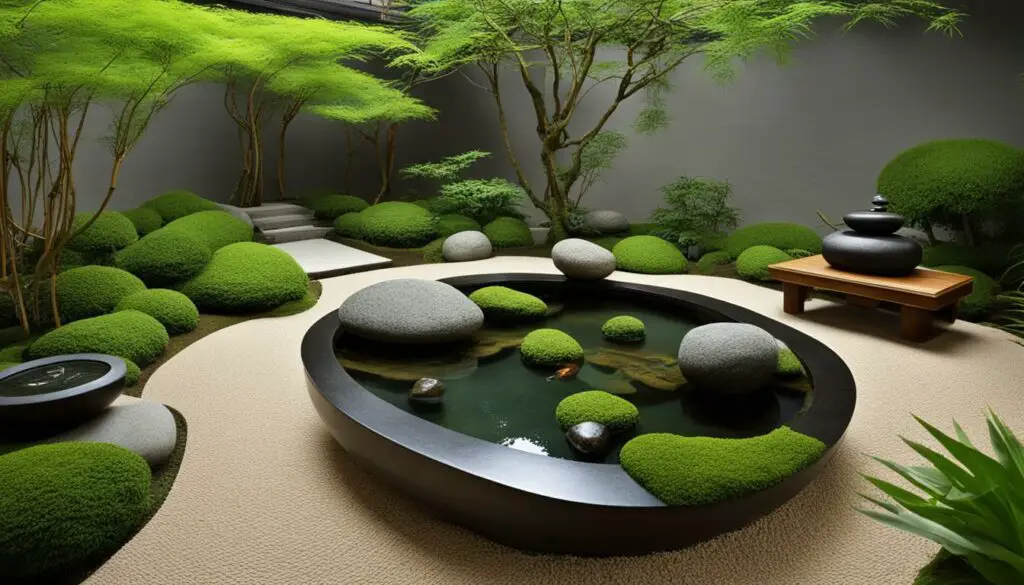
Choose symbols that resonate with your personal beliefs and values, and place them strategically throughout your home. Hang a dreamcatcher above your bed to promote restful sleep, or display a vision board in your office to inspire your goals.
Remember, feng shui is not just about the physical environment. It’s about creating a space that supports your spiritual growth and nourishes your soul. Incorporate these tips into your home, and watch as you deepen your connection with the divine.
Incorporating Feng Shui in Your Outdoor Spaces
Extend the principles of feng shui to your outdoor spaces for a harmonious and balanced environment. Whether you have a sprawling garden or a cozy balcony, there are many ways to optimize the energy flow and create a relaxing and rejuvenating outdoor space.
Begin by assessing the layout of your outdoor area and identifying areas for improvement. Consider the balance of yin and yang and aim for a mix of soft and hard elements, such as plants and stones. Use the bagua map to determine which areas correspond to which life aspects and focus on enhancing those areas with the appropriate colors and materials.
Introduce water features, such as a fountain or bird bath, to promote the flow of positive energy, or chi. Use outdoor lighting strategically to create a warm and inviting atmosphere and highlight the natural beauty of your space. Incorporate comfortable seating and outdoor decor that reflects your personal style and enhances the overall ambiance.
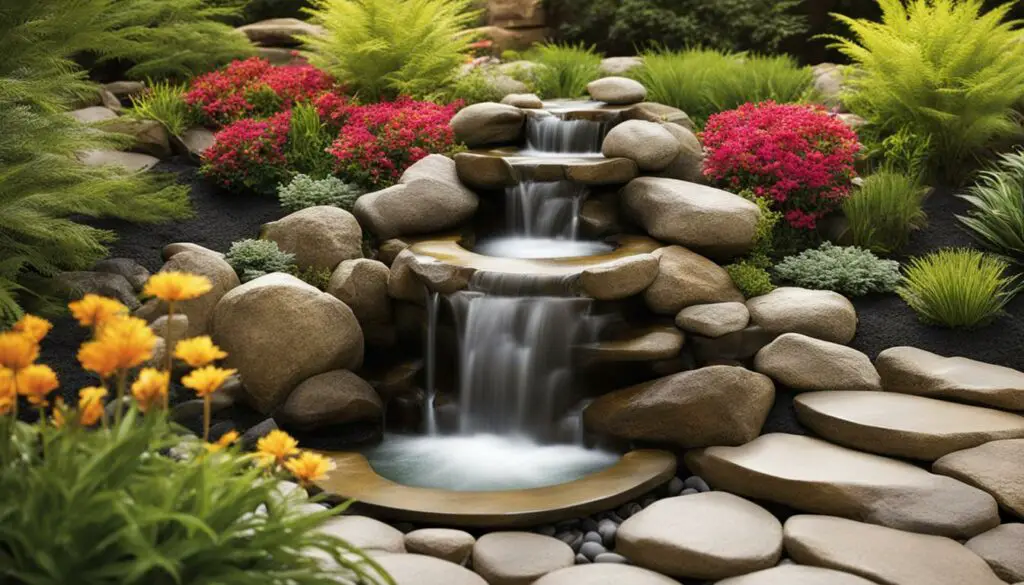
Table: Recommended Plants for Feng Shui Gardens
| Plant | Significance |
|---|---|
| Bamboo | Luck |
| Lavender | Relaxation, clarity |
| Rosemary | Memory, protection |
| Jasmine | Love, romance |
| Money Tree | Wealth, prosperity |
By incorporating feng shui principles into your outdoor spaces, you can create a sanctuary of peace and tranquility that supports your overall well-being. With the right balance of elements and careful attention to detail, your garden or patio can become a welcoming and rejuvenating retreat.
Maintaining and Sustaining a Harmonious Space
Now that you have implemented feng shui principles in your home, it’s important to maintain and sustain the harmonious energy flow. Regular energetic cleansing can help clear any negative or stagnant energy in your space. You can use natural elements such as sage, palo santo, or essential oils to purify the air and promote positive energy.
You can also update your space with the changing seasons. For example, in the spring and summer, bring in fresh flowers or plants to symbolize growth and vitality. In the fall and winter, add warm colors and cozy textures to create a sense of comfort and security.
It’s important to adapt to new circumstances and changes in your life as well. As you grow and evolve, your needs and desires may shift. Be open to making adjustments in your environment to reflect these changes and maintain the balance of energy in your space.
Remember, feng shui is a journey, not a destination. The more you practice and incorporate feng shui principles into your life, the more natural and intuitive it will become.

Whether you’re a beginner or an experienced practitioner, feng shui can transform your home into a harmonious and peaceful sanctuary. So, take this knowledge and continue your feng shui journey with confidence and intention. Your home and life will thank you for it.
Conclusion
Thank you for exploring the world of feng shui with our expertly curated ‘How to Feng Shui’ book guide. We hope you have gained valuable insights into the principles and techniques that can bring balance, harmony, and prosperity into your home.
Remember, feng shui is an ongoing practice, and it takes time and effort to maintain a harmonious space. Use the tips and tricks provided in this guide to assess your space, identify areas for improvement, and create a sacred sanctuary that reflects your unique personal style.
Don’t forget to refer back to our guide whenever you need guidance on specific feng shui practices or tips for addressing new challenges that may arise. Our ‘How to Feng Shui’ book guide is always here to support you on your journey towards a more balanced and harmonious life.
Be sure to share your progress and success with others in the feng shui community, and keep learning and exploring new ways to enhance your energetic space.
Order your copy of our ‘How to Feng Shui’ book today and continue your journey towards a more prosperous and fulfilling life!
FAQ
What is feng shui?
Feng shui is an ancient Chinese practice that focuses on harmonizing the energy flow in a space to create balance, harmony, and prosperity.
How can feng shui benefit my home?
Feng shui can enhance the energy in your home, promoting a sense of well-being, improving relationships, supporting health, and attracting abundance and success.
Do I need any prior knowledge or experience to use feng shui?
No, our ‘How to Feng Shui’ book guide is designed for both beginners and those with some prior knowledge. It provides step-by-step instructions and practical tips to help you implement feng shui principles in your space.
Can I apply feng shui techniques to any type of space?
Yes, feng shui principles can be applied to any type of space, including homes, offices, and outdoor areas. The techniques can be adapted to suit different environments and individual needs.
How long does it take to see results from feng shui?
The effects of feng shui can vary depending on various factors, such as the size of the space, the level of clutter, and the commitment to implementing the techniques. Some people may notice immediate positive changes, while others may experience gradual improvements over time.
Can I combine feng shui with other interior design styles?
Absolutely! Feng shui can be incorporated into any interior design style. It complements and enhances the overall aesthetic of a space, while also optimizing the energy flow.
Are there any specific colors or materials recommended for feng shui?
Yes, different colors and materials have specific meanings and energies in feng shui. Our book guide provides recommendations for colors and materials based on their associations and effects on energy flow.
How often should I practice feng shui in my home?
Maintaining a harmonious space is an ongoing process. It is recommended to periodically assess and update your feng shui practices to adapt to changes in your life and environment. Regular energetic cleansing and seasonal adjustments can help sustain the positive energy in your space.
Can I practice feng shui without making major changes to my home?
Yes, feng shui can be practiced at different levels, from making small adjustments to implementing larger-scale changes. Even simple modifications, such as decluttering, rearranging furniture, or adding specific objects, can have a positive impact on the energy of your space.
Where can I purchase the ‘How to Feng Shui’ book guide?
The ‘How to Feng Shui’ book guide is available for purchase on our website. Simply visit our online store to order your copy and begin your feng shui journey today!
